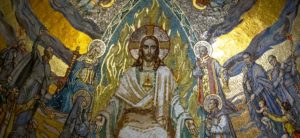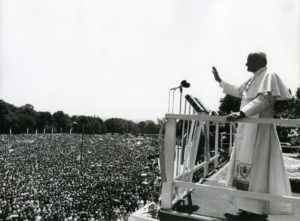INTRODUCTION
Born in 4th century Turkey, in a region called Cappadocia, Saint Basil first pursued education and a career in the law. Eventually he found himself drawn to a monastic vocation through his holy sister Macrina. Saint Basil would become revered in both Eastern and Western christianity for his great contributions to theology, monasticism, and liturgies (still in use today). He was a champion of the faith with a towering intellect, but also had a deep and intimate relationship with God. The sermon below reflects an expectation for the Holy Spirit at Pentecost to move in power and might. As we begin to allow ourselves to more fully hope for an end to this Pandemic, are we expecting God to move in our hearts and communities in power and might? As we prepare to gather together again are we intentionally making room for God in new ways?
From the treatise “On the Holy Spirit”
by Saint Basil the Great, bishop
(Cap. 9, 22-23: PF 32, 107-110)
The titles given to the Holy Spirit must surely stir the soul of anyone who hears them, and make him realize that they speak of nothing less than the supreme Being. Is he not called the Spirit of God, the Spirit of truth who proceeds from the Father, the steadfast Spirit, the guiding Spirit? But his principal and most personal title is the Holy Spirit.
To the Spirit all creatures turn in their need for sanctification; all living things seek him according to their ability. His breath empowers each to achieve its own natural end.
The Spirit is the source of holiness, a spiritual light, and he offers his own light to every mind to help it in its search for truth. By nature the Spirit is beyond the reach of our mind, but we can know him by his goodness. The power of the Spirit fills the whole universe, but he gives himself only to those who are worthy, acting in each according to the measure of his faith.
Simple in himself, the Spirit is manifold in his mighty works. The whole of his being is present to each individual; the whole of his being is present everywhere. Though shared in by many, he remains unchanged; his self giving is no loss to himself. Like the sunshine, which permeates all the atmosphere, spreading over land and sea, and yet is enjoyed by each person as though it were for him alone, so the Spirit pours forth his grace in full measure, sufficient for all, and yet is present as though exclusively to everyone who can receive him. To all creatures that share in him he gives a delight limited only by their own nature, not by his ability to give.
The Spirit raises our hearts to heaven, guides the steps of the weak, and brings to perfection those who are making progress. He enlightens those who have been cleansed from every stain of sin and makes them spiritual by communion with himself.
As clear, transparent substances become very bright when sunlight falls on them and shine with a new radiance, so also souls in whom the Spirit, become spiritual themselves and a source of grace for others.
From the Spirit comes foreknowledge of the future, understanding of the mysteries of faith, insight into the hidden meaning of Scripture, and other special gifts. Through the Spirit we become citizens of heaven, we enter into eternal happiness, and abide in God. Through the Spirit we acquire a likeness to God; indeed, we attain what is beyond our most sublime aspirations – we become God.




